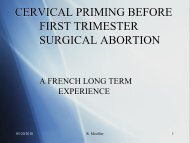Journal of Contraception Reproductive Health Care - The European ...
Journal of Contraception Reproductive Health Care - The European ...
Journal of Contraception Reproductive Health Care - The European ...
You also want an ePaper? Increase the reach of your titles
YUMPU automatically turns print PDFs into web optimized ePapers that Google loves.
<strong>The</strong> 8th Congress <strong>of</strong> <strong>The</strong> <strong>European</strong> Society <strong>of</strong> <strong>Contraception</strong> Abstracts <strong>of</strong> Free Communications<br />
FC3-07<br />
A collaborative clinic between contraception and sexual health services and the adult congenital heart<br />
disease clinic<br />
P. Rogers (1), D. Mansour (1), A. Mattinson (2), J. J. O’Sullivan (3)<br />
<strong>Contraception</strong> and Sexual <strong>Health</strong> Service, Newcastle upon Tyne, UK (1); Associate Specialist, <strong>Contraception</strong> and Sexual <strong>Health</strong> Service,<br />
Newcastle upon Tyne, UK (2); Consultant in Paediatric Cardiology, Freeman Hospital, Newcastle upon Tyne, UK (3)<br />
Background: <strong>The</strong> success <strong>of</strong> cardiac surgery has created a new medical community – the ‘grown-up’ congenital heart patients.<br />
Women with congenital heart disease may need specialist advice about contraception and pregnancy.<br />
Objective: To investigate whether women with congenital heart disease were receiving appropriate advice on contraception.<br />
Methods: A contraceptive history was taken, via a predetermined form on 46 consecutive female patients, consenting to see a<br />
family planning doctor, at the adult congenital heart disease clinic, Freeman Hospital, Newcastle upon Tyne.<br />
Results: Sixteen women (35%) had never discussed contraception with a health pr<strong>of</strong>essional. One third <strong>of</strong> women who had<br />
previously discussed contraception with either their GP or family planning clinic had received inappropriate advice. <strong>The</strong>re had<br />
been eight unplanned pregnancies in seven women. Thirteen out <strong>of</strong> eighteen women using condoms as their main method <strong>of</strong><br />
contraception changed to a more reliable hormonal method. Four out <strong>of</strong> seven women not using any contraception started on a<br />
hormonal method. Two women changed their hormonal contraception to a more reliable method. <strong>The</strong>re was a poor knowledge<br />
among the women about hormonal methods particularly Depo-provera and Implanon.<br />
Conclusions: <strong>The</strong>re is poor provision <strong>of</strong> contraceptive advice for women with congenital heart disease. A lot <strong>of</strong> women are<br />
unaware <strong>of</strong> the methods available to them. Many women had not received any advice or had been given inappropriate advice.<br />
Simply denying hormonal methods due to uncertainty is not adequate advice. <strong>Contraception</strong> and pregnancy should be raised<br />
with all female patients with congenital heart disease. Informed advice is vital to avoid the potential risks <strong>of</strong> an unplanned pregnancy.<br />
A combined clinic between the cardiologist and family planning doctor <strong>of</strong>fers the optimal informed advice as neither<br />
alone has expertise in the other’s field.<br />
SESSION 4: NEW DEVELOPMENTS IN CONTRACEPTION, SEXUAL AND REPRODUCTIVE<br />
HEALTH<br />
FC4-01<br />
Self-administration <strong>of</strong> Depot Provera (DMPA) – the way forward?<br />
F. Lakha, A. Glasier<br />
Lothian Primary <strong>Care</strong> NHS Trust and Department <strong>of</strong> Obstetrics and Gynaecology, University <strong>of</strong> Edinburgh, Edinburgh, UK<br />
Introduction: Depo Provera (DMPA) is a popular method <strong>of</strong> contraception in the UK, but the need to attend for injection<br />
every 12 weeks involves costs to the health service and inconvenience to the user. A micronised preparation <strong>of</strong> DMPA for<br />
subcutaneous use has been developed and will allow self-administration. In anticipation <strong>of</strong> subcutaneous DMPA becoming available,<br />
we undertook a survey to determine what percentage <strong>of</strong> women would want to self-administer the injection and what<br />
would be the most suitable method for reminding women to do it.<br />
Methods: <strong>The</strong> survey was undertaken in a large family planning clinic in Edinburgh, Scotland. During one calendar month, a<br />
self-administered questionnaire was <strong>of</strong>fered to every woman attending for repeat DMPA injection. A questionnaire was attached<br />
to every packet <strong>of</strong> DMPA thus ensuring 100% targeting <strong>of</strong> DMPA users. All data will be entered onto a Micros<strong>of</strong>t access database<br />
and analysed using SPSS.<br />
Results: 176 women completed the questionnaire, there were no refusals. 118 women (67%) were keen to self-administer<br />
DMPA. 89% <strong>of</strong> these women felt that they would need a reminder for when to inject. <strong>The</strong> most popular request was for a<br />
verbal reminder (33%) <strong>of</strong> the next 3 dates for injection at the time <strong>of</strong> their annual review; 30% <strong>of</strong> women preferred to receive a<br />
letter, and 25% a text message, just prior to the date <strong>of</strong> the next injection. Of the 58 women who did not wish to self-administer<br />
DMPA, the commonest reason was a dislike or fear <strong>of</strong> needles (62%); 43% were concerned that they would administer the<br />
contraceptive incorrectly; whilst 33% felt it was important to see a doctor every 3 months. Forgetting to self-administer was a<br />
concern to only 12% <strong>of</strong> women.<br />
Conclusions: Most women are interested in self-administration <strong>of</strong> DMPA and would like to be informed <strong>of</strong> future administration<br />
dates at their annual review.<br />
40 <strong>The</strong> <strong>European</strong> <strong>Journal</strong> <strong>of</strong> <strong>Contraception</strong> and <strong>Reproductive</strong> <strong>Health</strong> <strong>Care</strong>








